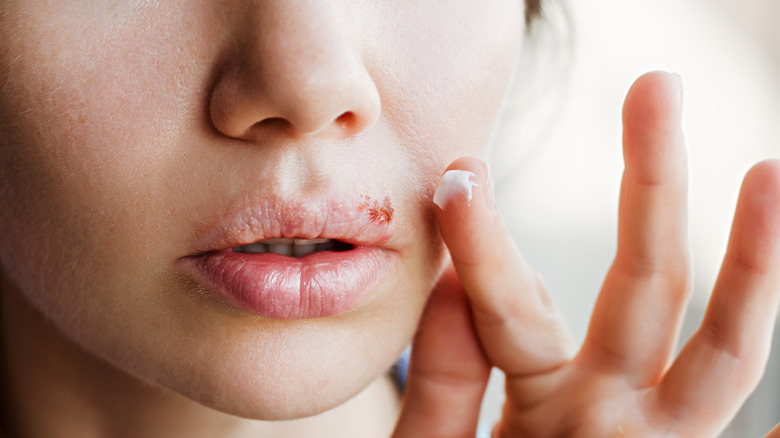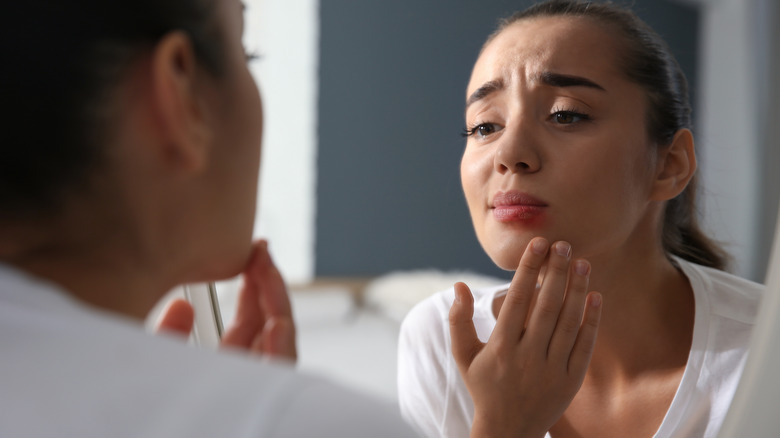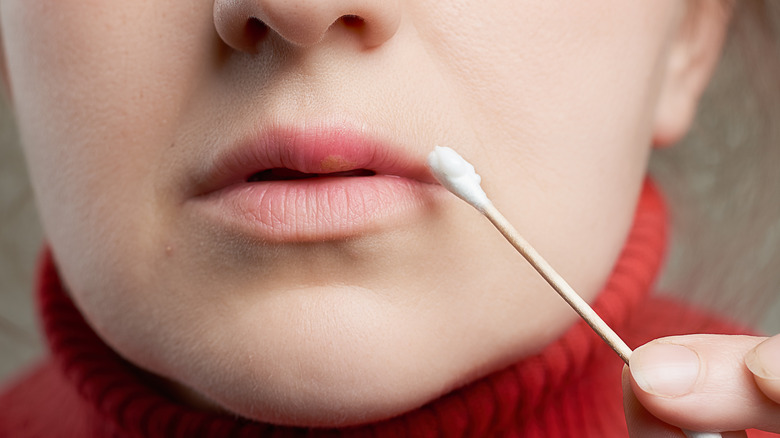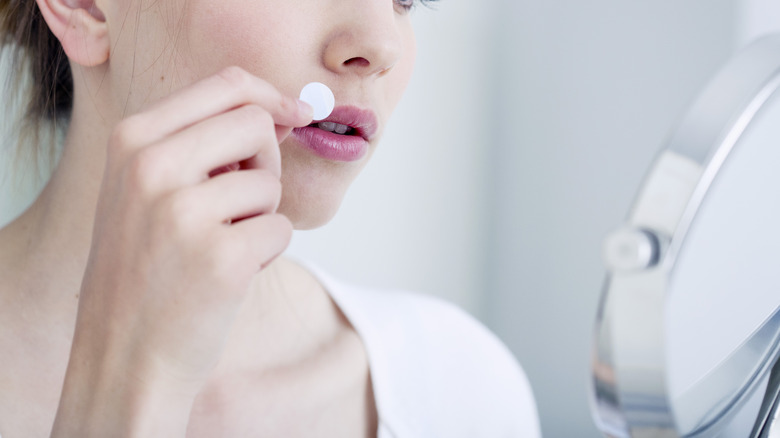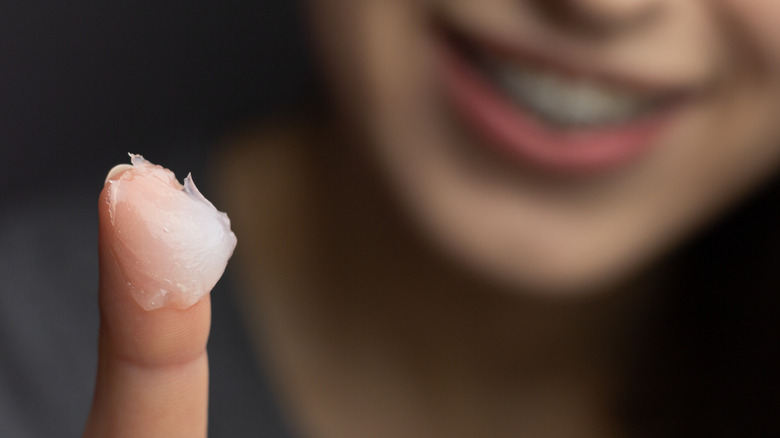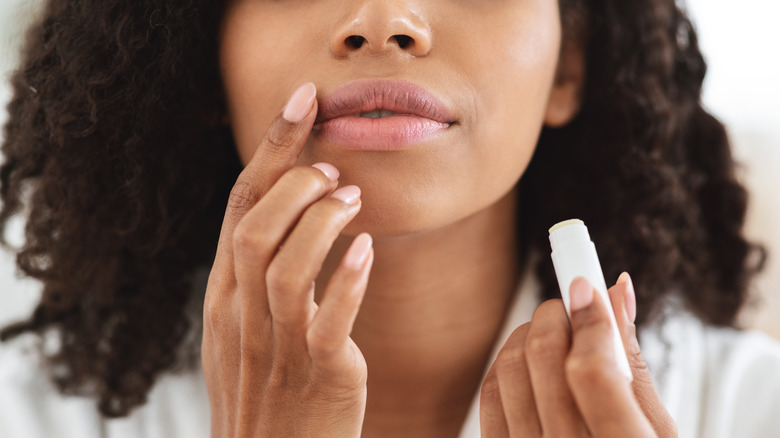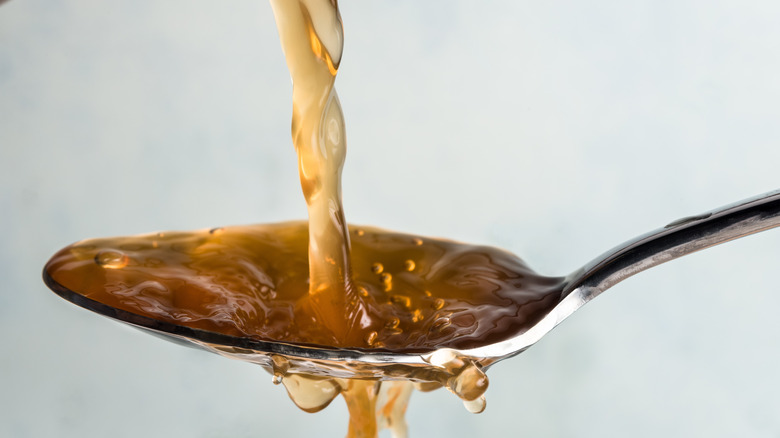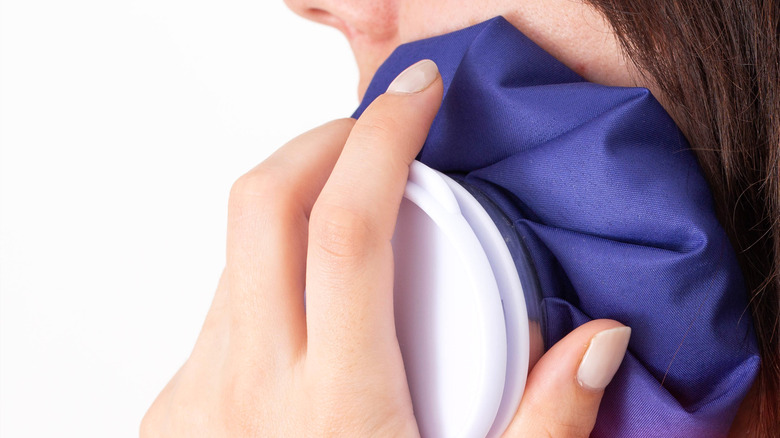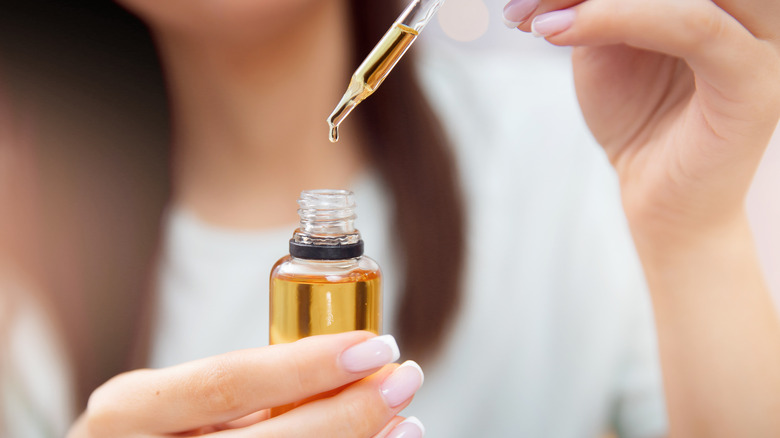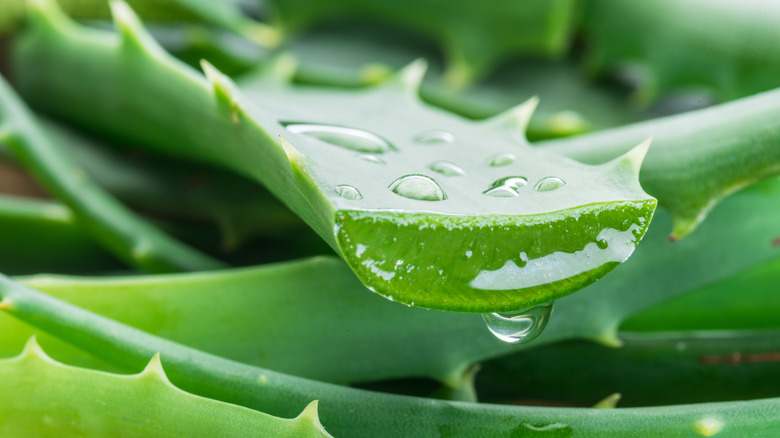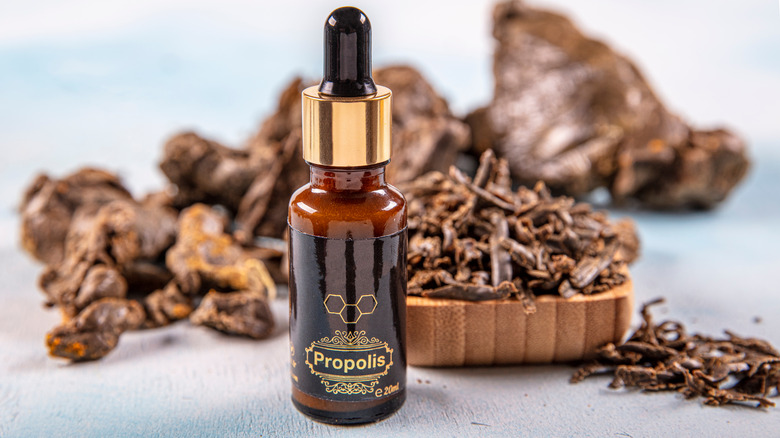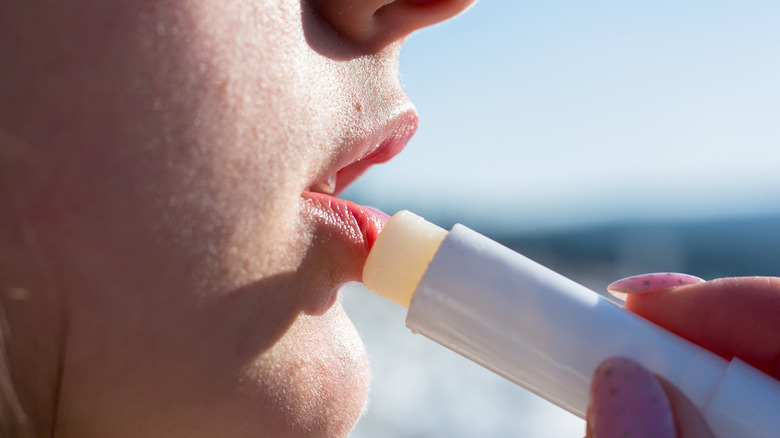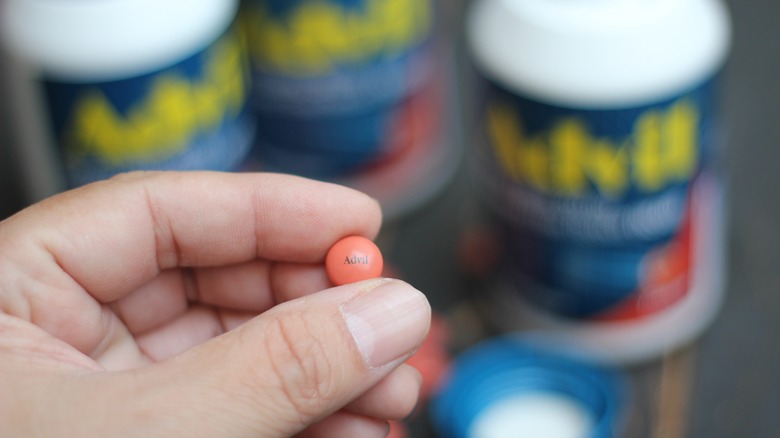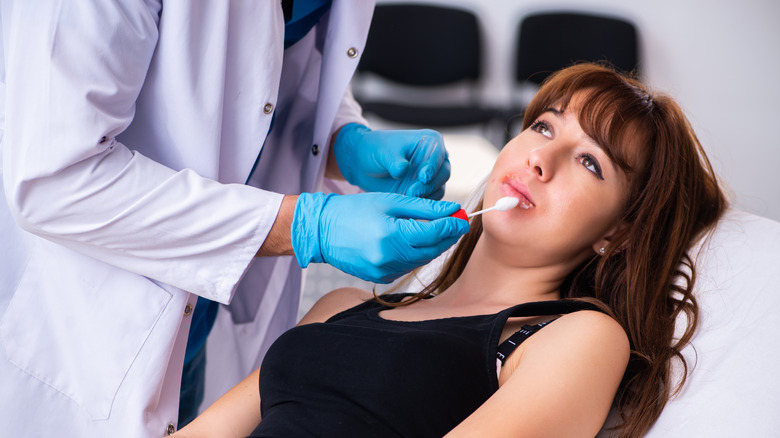How To Get Rid Of Cold Sores
If you're like most people, chances are you've had to deal with a pesky cold sore at some point in your life. Cold sores, as noted by Healthline, are small inflamed, itchy blisters that appear around the mouth area. They often crack, leak fluid, and can be quite painful. Unfortunately, it can take anywhere from several days to a few weeks for a cold sore to "crust over and heal," according to Johns Hopkins Medicine. While there's no way to completely prevent cold sores from popping up, there are ways to promote cold sore healing and eliminate the discomfort associated with the irritating skin condition.
If you're hoping to speed up the healing process of your cold sore, or simply make healing more comfortable, there are several remedies that may help you along the way. So, keep on reading to learn what causes cold sores and how to keep this troublesome skin condition away.
What causes cold sores?
It's pretty simple: All cold sores are caused by the herpes simplex virus, or HSV, according to the American Academy of Dermatology Association. There are two types of herpes virus— type 1 or HSV-1, often known as oral herpes, and type 2, or HSV-2, known as genital herpes (per the World Health Organization). Both strains can cause cold sores, though the skin concern is highly associated with HSV-1. Between 50% and 80% of U.S. adults are estimated to have oral herpes, according to Johns Hopkins Medicine, making cold sores quite common amongst the general population. Stress and lack of sleep can even lead to flare-ups.
Once you get the herpes virus, it sticks with you for life, meaning there's no way to "cure" HSV-1 or HSV-2 (per the American Academy of Dermatology Association). But there are ways to minimize symptoms of both viruses — and that includes lessening the severity and frequency of cold sores. If you're amongst the U.S. majority that experiences cold sores, read up on these ways to treat the HSV symptom through pain relief methods and optimal healing practices.
Antiviral medications and creams are good for treating cold sores
Since cold sores are caused by a virus, there are several antiviral medications and medicated creams for the treatment of the skin-related condition. According to the American Academy of Dermatology Association, using over-the-counter products that contain docosanol or benzyl alcohol are especially effective in the treatment of cold sores. You may be familiar with Abreva, which is a common over-the-counter treatment containing docosanol, according to the Mayo Clinic. When applying cream medication to a cold sore, the Mayo Clinic advises using a clean cotton swab to keep the process as sterile as possible.
If you frequently experience cold sores, your doctor can prescribe an antiviral medication regime that may reduce the severity and frequency of your flare-ups. Common effective cold sore medications include Famvir, Zovirax, and Valtrex. Doctors may also prescribe prescription creams that are more powerful than over-the-counter options for especially tough cases (per the American Academy of Dermatology Association).
Cold sore patches can help heal cold sores
Cold sore patches are made of hydrocolloid gel, providing an optimal environment for cold sore healing. When applied to a wound, hydrocolloid bandages form a gel that creates a moist, protective environment, which promotes faster healing time, according to Medical News Today. Often used in hospital settings for the treatment of burns and skin ulcers, this type of bandage also reduces contamination or infection of a wound when used properly. In fact, a 2008 study found that hydrocolloid patches are as effective as topical creams when used in the treatment of cold sores.
To use, the NHS says you should apply the patch to the wound until it heals, which could be several days. Hydrocolloid patches are water-resistant and long-lasting, meaning one patch will likely treat one cold sore completely. Notably, cold sore patches can often help disguise the skin concern for those concerned with the appearance of their healing blister.
Petroleum jelly is an at-home remedy that may help relieve discomfort from cold sores
While petroleum jelly won't help heal a cold sore through powerful active ingredients, the medicine cabinet staple can ease discomfort associated with cold sores. When applied to a cold sore, petroleum jelly can help to prevent further cracking or dryness of the skin at the site, according to the Mayo Clinic. This is because the oil and wax-based substance creates a protective barrier between the outside world and your wounded skin, retaining moisture and promoting healing (per Healthline).
Petroleum jelly has long been used as a moisturizing agent for dry, cracked, and irritated skin and for conditions like chapped lips, cracked heels, and diaper rashes. Though there isn't any scientific research on the benefits of treating a cold sore with petroleum jelly, this inexpensive drugstore buy is a popular (and accessible) home remedy. That's especially true if your main concern is soothing any dryness and cracking at the cold sore site.
Some studies suggest treating cold sores with lemon balm
If you are looking for more holistic treatments for cold sores, some older studies claim that lemon balm is an effective way to reduce redness and swelling associated with the virus-caused skin concern. Lemon balm, which comes from the mint family, is a lemon-scented herb known for its healing properties, per WebMD. A highly-cited 1999 study suggests the herb is a particularly effective treatment for cold sores, though more research is needed to draw definitive conclusions of the plant's medicinal properties. Even though the herb has been found to soothe inflammation, lemon balm has no impact on cold sore scabbing or associated pain, per the University of Maryland Medical Center.
For application to cold sores, use lemon balm chapstick, cream, or a diluted essential oil compress for the best results, per Healthline. The publication also advises that it's best to patch test lemon balm products before applying the product to inflamed, open skin to ensure you don't have an adverse reaction.
Apple cider vinegar compress may be beneficial when it comes to cold sores
Though no scientific evidence has confirmed that apple cider vinegar is an effective treatment for cold sores, it's an extremely common at-home remedy for the skin concern (per Healthline). Though studies haven't been performed specifically on cold sores and apple cider vinegar, the product is scientifically proven to have antibacterial and antimicrobial properties, per a 2019 study in Natural Product Research. This means that the product, when applied via a compress, may help keep a cold sore wound infection-free and aid in treating inflammation.
Apple cider vinegar is also effective at removing dead skin cells, as Yale dermatologist Mona Gohara told Good Housekeeping in 2017. This property may help cold sores go away more quickly during the scabbing stage, per Healthline. To use in a compress, Gohara recommends diluting one tablespoon of apple cider vinegar in two cups of water (per Good Housekeeping).
Even when diluted in a compress, apple cider vinegar can be harsh on sensitive skin, as Georgia-based dermatologist Lauren Ploch told PopSugar in 2018. She advises patch testing the compress on healthy skin for any potential reaction before applying to a cold sore.
Applying a cold compress to a cold sore can help reduce itching, swelling, and irritation
Applying an ice compress or cold towel to a cold sore can help reduce swelling, irritation, pain, and itch, per the American Academy of Dermatology Association. Though this icy treatment won't speed up the healing process of your cold sore, it's one of the more accessible treatments for the skin concern. For best results, Healthline recommends applying a cold compress three times a day for 10 minutes at a time.
If you are using ice or a gel pack for a cold compress, be sure to use a cloth barrier between your skin and the frozen item (per Healthline). For additional benefits, the Mayo Clinic recommends using a cold, wet cloth as a compress to help remove bothersome crusting and promote the healing process.
Along with recommending a traditional cold compress, the American Academy of Dermatology Association even recommends sucking on ice chips for cold sore relief. Consider it part treatment, part snack.
The antiviral properties of some essential oils may help in treating cold sores
Topically applying essential oils can be a homeopathic healing regimen for cold sores by potentially shortening healing time and treating discomfort, per Healthline. Essential oils that are especially popular for the treatment of cold sores include peppermint, tea tree, oregano, thyme, anise, chamomile, and eucalyptus oil. All have antiviral properties that can help speed healing, according to various scientific research, although Healthline does specify that more research is needed on using essential oils as a cold sore treatment.
Essential oils must always be diluted in a carrier oil before applying to skin, according to Medical News Today. Popular carrier oils include sweet almond oil, coconut oil, and olive oil. Usually, it's suggested to add two to five drops of essential oil per 1 ounce of carrier oil (per Medical News Today). Still, it's important to test the diluted essential oil mixture on healthy skin before applying to your cold sore to test for any possible adverse reaction.
Some studies and medical professionals suggest using aloe vera for cold sores
Aloe vera is noted for its antiviral, antibacterial, and anti-inflammatory properties, which is why a 2016 study in the Journal of Dentistry connected the plant to effectively treating cold sores. While you may have an aloe vera plant in your home, aloe vera gel or cream can be purchased at most drugstores, as it is a popular treatment for soothing and healing sunburns. "Aloe can soothe the pain from cold sores and make them heal faster by making your skin cells regenerate faster — which means healthy cells will grow to replace the infected ones," as Manasija Rath, a physician for Penn Presbyterian Internal Medicine, shared in an article for Penn Medicine.
To apply aloe vera to a cold sore, use a clean cotton swab on clean skin to ensure a sterile application (per Mount Sinai). However, keep in mind that Medical News Today advises speaking to a doctor before using aloe vera, or any home remedy, on a cold sore.
Bee-produced propolis may provide some soothing relief for cold sores
Propolis, a compound produced by bees that is often present in honey-derived topicals, may help soothe and heal cold sores, according to scientific research. A 2021 study found that propolis is a proven "antiherpetic agent," healing herpes simplex virus-induced wounds (like cold sores) in an average of eight days. The study also found that propolis provided pain relief to participants.
According to MedlinePlus, a government website from the National Library of Medicine, propolis is also suggested to be an anti-inflammatory compound, along with having suggested antiviral and antibacterial properties. The site recommends using ointments or creams containing 0.5% to 3% propolis for cold sore treatment, which can be found in most drugstores and online. Patch test any propolis product before applying to a cold sore to ensure there's no adverse reaction. You may also want to refrain from using propolis-containing products if you have a bee allergy (per MedlinePlus).
Protect your lips with Zinc oxide cream or sunscreen if you have an outbreak
Sun exposure is scientifically proven to exacerbate cold sore symptoms, meaning you'll want to protect your lips any time you go outside. Both sunscreen and zinc oxide cream can help shield a healing cold sore from the sun, ensuring you are rid of your pesky problem as soon as possible.
The American Academy of Dermatology Association recommends using a broad-spectrum SPF lip balm of 30 or higher to protect your lips as your cold sore heals. Applying a cream or balm to the affected area can also help moisturize your healing skin, preventing further skin cracking or discomfort.
Studies have also found that sunscreen can help reduce future cold sore flare-ups, as sunlight exposure and cracking lips can be catalysts for cold sore formation. Wearing an SPF lip balm year-round is also recommended to protect from sun-induced cold sores for those prone to flare-ups (per the American Academy of Dermatology Association).
Ibuprofen or acetaminophen may help with redness and swelling caused by cold sores
If you are experiencing pain due to a lingering cold sore, common over-the-counter pain medications can help reduce discomfort associated with the troublesome skin concern, according to the Mayo Clinic. Not only that, but medications like Ibuprofen (Motrin or Advil), aspirin (Bayer or Excedrin), and naproxen sodium (Aleve) also act as anti-inflammatories, according to the Cleveland Clinic. This may help clear up redness and swelling due to inflammation at the cold sore site (per NHS).
Since over-the-counter pain relievers largely address cold sore discomfort, it's likely best to use the medications in tandem with other cold sore treatments like healing creams, sunscreen, or petroleum jelly, as Healthline notes. This will ensure the cold sore site stays moisturized and protected from further cracking or infection, which would only add to the pain. If your cold sore pain is especially unbearable and doesn't resolve with over-the-counter treatment options, this would be considered a severe symptom requiring a doctor's consultation (per the Mayo Clinic).
Call a doctor if your cold sore won't go away
In most cases, cold sores go away on their own within two to four weeks (per the Mayo Clinic), with the above treatments helping to speed up the process or simply make it more comfortable. But if your flare-up is especially painful, lasts for two weeks with minimal healing, or worsens with over-the-counter treatments, it's a good idea to contact a doctor for a professional opinion, as Medical News Today advises. You should also contact a doctor if the cold sore is near your eye or if you have a weakened immune system. A doctor may advise you to take prescription creams or medications that are stronger than over-the-counter options.
If you are commonly dealing with cold sores, effective prescription antiviral medication regimens can help reduce the frequency and severity of flare-ups, according to Harvard Health Publishing. In some cases, these prescription treatments can reduce the severity of outbreaks and can suppress your HSV-1 viral load to reduce the likelihood of the outbreak from returning by about 33.3%, as Harvard Health notes.
